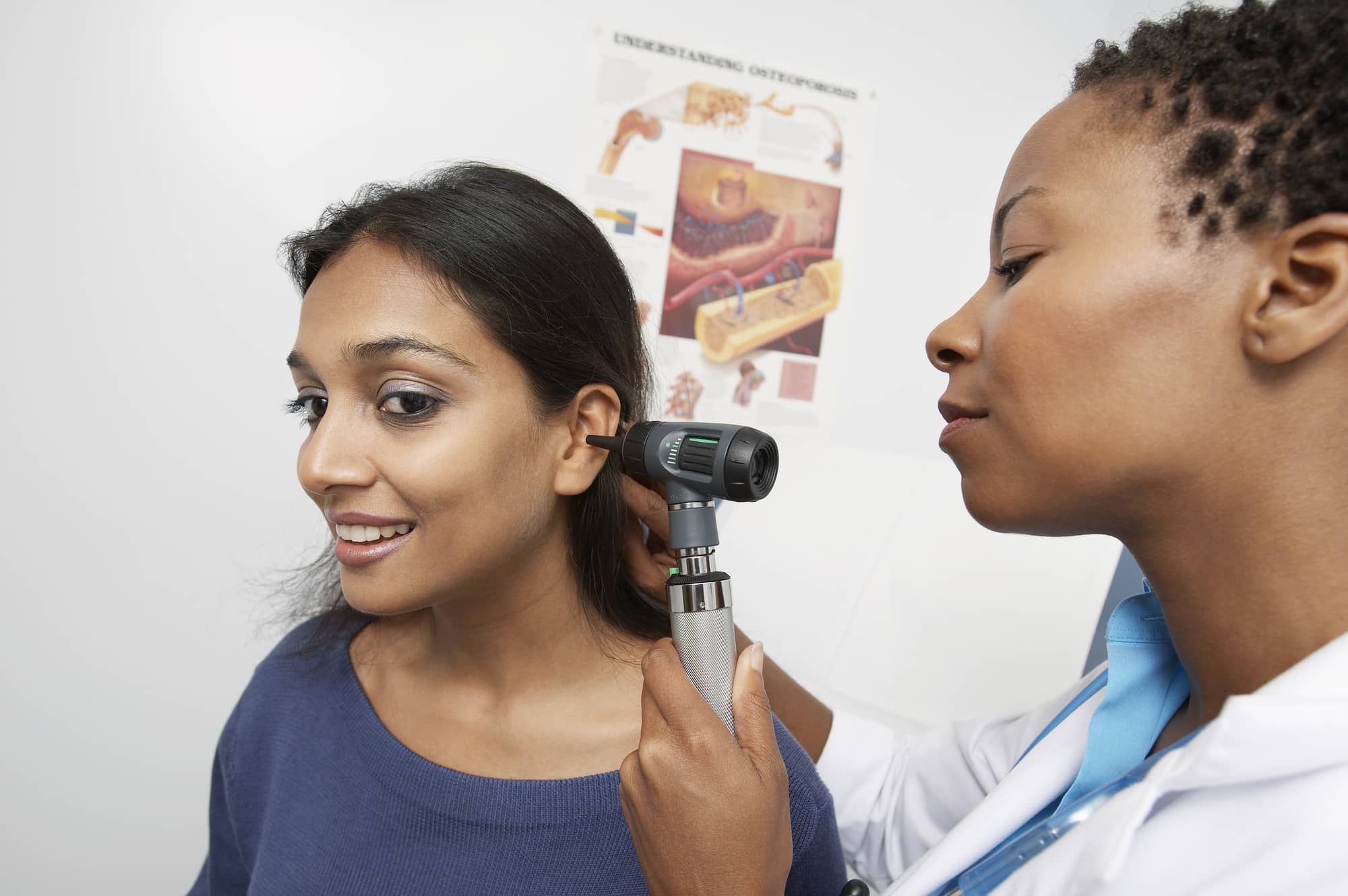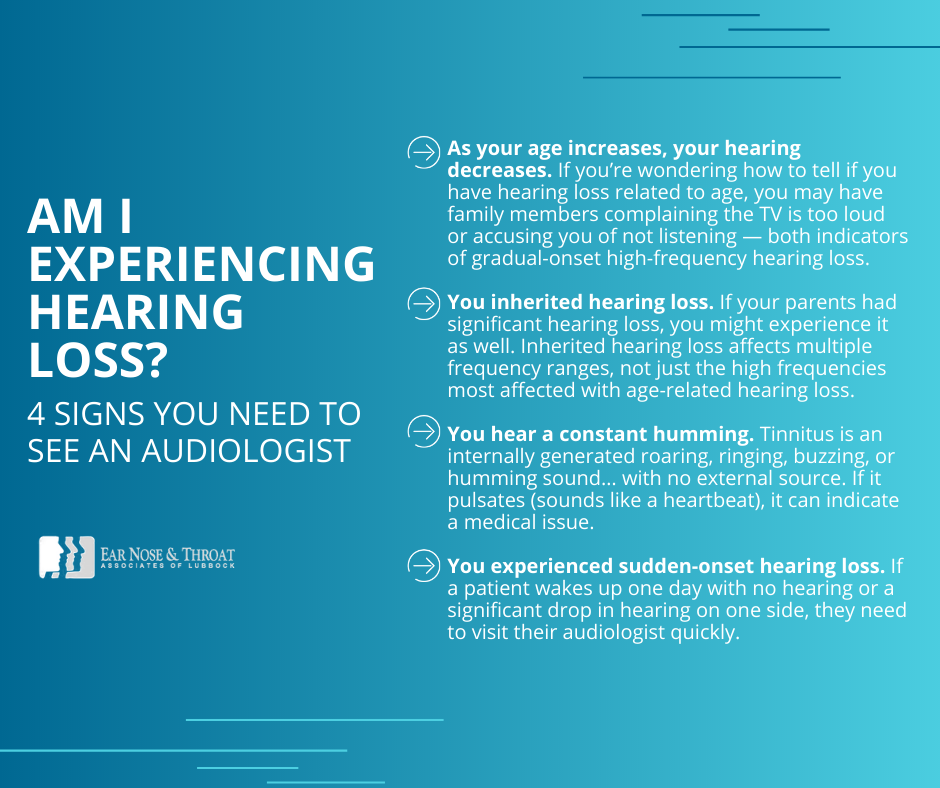4 Signs You Need to See an Audiologist

You can hear, but you can’t understand words clearly. You wonder if it’s you, or if other people are just quietly mumbling. If you realize it’s your hearing, you wonder what will come next… and what you can do about it.
Preventing noise-induced hearing loss is the best thing you can do. Wearing hearing protection and reducing exposure to excessively loud sounds can make a significant impact in preserving your hearing.
But some patients develop hearing loss they can’t stop or prevent.
Not all hearing loss is related to noise exposure. Inherited patterns of hearing loss, injury to the inner ear, virus in the inner ear, general “unknown” causes of hearing loss, and age-related changes all can contribute to a decreased ability to hear.
If you suspect hearing loss, it’s time for an evaluation.
Maybe you’re wondering how to tell if you have hearing loss — or if something else causing the problem. Perhaps you can hear, but you can’t understand words. Maybe you’re struggling daily in your work, school, or family environments. Maybe you have a persistent humming noise that’s becoming a more frequent disturbance.
If these symptoms start to occur, it’s time to visit an audiologist.
How To Tell If You Have Hearing Loss
1. As your age increases, your hearing decreases
Age-related hearing loss is relatively common. In medical terms, we call it presbycusis. Essentially, as a patient ages, the auditory system doesn’t function as well as it used to. This type of hearing loss typically affects higher frequencies and is gradual — patients just slowly get to the point where they’re not hearing those sounds.
Ultimately, when this loss of high-frequency hearing starts to affect a patient’s day-to-day communication, they want to come in to learn about potential solutions.
If you’re wondering how to tell if you have hearing loss related to age, you may have family members complaining the TV is too loud or accusing you of not listening — both indicators of gradual-onset high-frequency hearing loss.
2. You inherited hearing loss
If your parents had significant hearing loss, you might experience it as well. Inherited hearing loss affects multiple frequency ranges, not just the high frequencies most affected with age-related hearing loss.
We see an increasing number of people being proactive with this condition. After dealing with hearing loss with their parents, these patients often come in sooner to stay on top of amplification and recommendations to prevent it from interfering in their daily life.
3. You hear a constant humming
Tinnitus is an internally generated roaring, ringing, buzzing, or humming sound… with no external source. If it pulsates (sounds like a heartbeat), it can indicate a medical issue.
If you have it, get it checked out — it can be something insignificant or it may need further investigation. We’ll ask you to describe the noise and get an idea of where the hearing loss is occurring.
For many, tinnitus is the brain’s response to hearing loss. For these patients, hearing aids may help alleviate internal noise.
However, tinnitus can also happen without hearing loss. We take steps to quickly rule out these causes or refer you for treatment at the beginning of the process.
4. You experienced sudden-onset hearing loss
If a patient wakes up one day with no hearing or a significant drop in hearing on one side, they need to visit their Audiologist quickly. We recommend an evaluation as soon as possible in case there is a need for medical intervention and to prevent permanent hearing loss. Often, this loss of hearing is accompanied by tinnitus and dizziness.
For patients with sudden-onset asymmetrical hearing loss, we start with a full hearing test, identifying the location of the problem (outer, middle, or inner ear), and then can move to either treatment or further evaluation with an MRI.

Can I Prevent Hearing Loss?
Only one type of hearing loss is 100% preventable — noise-induced hearing loss. Patients can develop hearing loss because they’ve been exposed to excessively loud noises in their environment, whether it be gunfire, fireworks, or daily activity such as working in an industry with daily loud sounds.
When patients know they’re exposed to loud, recurrent sounds (recreationally or professionally), they need to wear hearing protection to prevent damage to the hearing system. If you’re in construction, landscaping, agriculture, or even the music industry, protect the hearing you have.
Should I visit an Audiologist?
When it comes to hearing, timing is important. If you’ve wondered how to tell if you have hearing loss and relate to the descriptions above, schedule time with an Audiologist as soon as possible.
Remember, Audiologists are different from hearing aid specialists. Audiologists have doctorate degrees in audiology and can provide a full range of services to address hearing issues. Plus, if you’re able to visit an Audiologist who works with an ENT (as is the case with ENT Associates of Lubbock), you’ll have quick access to a physician if medical evaluation if necessary.
Dr. Thackrey has been providing Audiology services to West Texas residents since 2006. She is licensed in the State of Texas and is a member of the American Speech-Language-Hearing Association (ASHA). She specializes in hearing evaluations of all ages, but is especially skilled in the selection, fitting, programming and servicing of hearing aids. Learn more about Dr. Thackrey
Categories:







